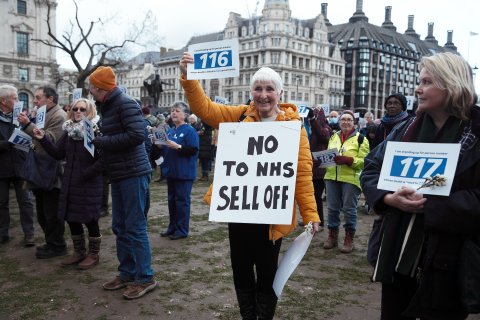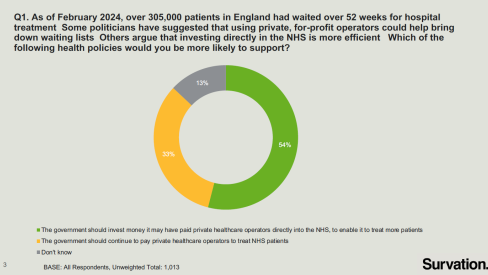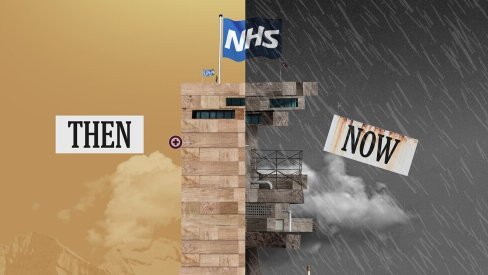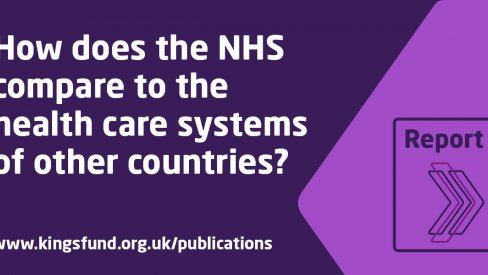
21 October 2024
According to the Telegraph, private healthcare companies are asking Health Secretary Wes Streeting to guarantee them access to NHS contracts and public money for the long term. In exchange, they are promising to spend £1 billion building up their own facilities.
How does the private healthcare sector stand to benefit from this plan? All the facilities they build will be privately owned. And private healthcare shareholders stand to make billions in profit from NHS money.
But what does the public get? NOTHING. This is a bad deal for the public.
This is Private Finance Initiative (PFI) 2.0, and it is far worse than PFI 1.0.
In this blog, we explain PFI 2.0, discuss why its effects on the NHS are likely to be far worse than PFI 1.0, and tell you what you can do to stop PFI 2.0 in its tracks.
What’s PFI 2.0?
In a recent letter to Health Secretary Wes Streeting, David Hare, chief executive of the Independent Healthcare Providers Network (IHPN), has pitched an idea for the private sector to “rescue” the NHS.
According to the Telegraph, the private healthcare sector is prepared to spend £1 billion on expanding their facilities so that they can treat more NHS patients. In exchange, the government will guarantee them access to NHS contracts and budgets for the long term.
The context for this proposal is the government’s current indication that the NHS will only receive enough money in the Autumn Budget to carry out its basic work. This means that the NHS will not have the resources to expand its own facilities to take on treating more patients. And this is the space into which the private sector is proposing to step in and "rescue" the NHS by building up its own capacity.
Scroll down to read 5 reasons why this is a terrible idea for patients and the NHS.
This would be the biggest expansion in private involvement in providing health services in the history of the NHS. It would dwarf Tony Blair’s £500 million Independent Sector Treatment Centres policy in 2006, which saw the government fund the creation of private clinics for tests, checks and surgeries.
Why is this plan PFI 2.0?
Private Finance Initiative was a policy that was initially launched by John Major in 1992 but was drastically expanded by Tony Blair in the late 1990s and early 2000s.
The rough underlying idea was that the government wanted to build more hospitals, schools and other facilities but didn’t want to spend the money to build them. This created an opening for the private sector to jump to the “rescue”. They proposed that they could put up the upfront costs of building schools, hospitals, and public facilities. They would then be repaid by the public sector over the long term.
The way this was done in the NHS was that a private finance company would be contracted by the government to front the cost of building a hospital. The local NHS Trust using the hospital would then have to pay back those costs with interest over a 25-30-year term. At the end of this term, the hospital will belong to the NHS.
On its face, the NHS gets to expand its capacity, but the upfront spending for this comes from the private sector, reimbursed several times over by the public.
Here are three ways in which the plan proposed by the IHPN, being considered by Wes Streeting, has the same basic structure as PFI. In both cases:
- The proposal involves the idea that healthcare capacity can be expanded without government spending
- Spending will come from the private (healthcare or finance) sector, and
- In exchange, the private sector will be guaranteed returns through long-term (debt repayment or health services) contracts giving them access to NHS money
Why is PFI 2.0 far worse than PFI 1.0?
PFI 1.0 and PFI 2.0 are very similar. But when it comes to their likely effects on patients and the NHS, PFI 2.0 is far worse.
It is useful to start by being clear that PFI 1.0 was disastrous for our public services. So bad in fact that in October 2018, the then-Conservative government announced that no new PFI contracts would be entered into.
Despite only receiving around £13 billion in assets, NHS Trusts were saddled with over £80 billion in PFI debts. PFI has done significant damage to NHS Trust budgets, and, as a consequence, to their ability to provide the care that NHS patients deserve and that Trusts want to provide.
A 2019 report by the Institute for Public Policy Research (IPPR) found that some NHS Trusts are spending £1 in every £6 available to them servicing PFI debts.
Some trusts are in greater PFI debt than others, leading to what has been named the “PFI postcode lottery”. Trusts like North West Anglia, Sherwood Forest, University Hospitals Coventry and St Helens and Knowsley all spend over 10% of their budget on PFI debts.
PFI debts deprive hospitals of funds that could instead go into medical supplies and patient care. For example, according to a 2022 New Statesman analysis, some NHS Trusts are spending more on PFI debts than on medical supplies.
If PFI 1.0 was one of the nails in the coffin of the NHS as we know it, PFI 2.0 is the true end of our NHS as a public service that works for patients, not profit.
But all this fades into insignificance when we consider how badly PFI 2.0 could go for the NHS.
5 reasons PFI 2.0 is a terrible idea for patients and the NHS
1. The private sector gets everything, and the public gets nothing
At the end of each PFI 1.0 contract, the public receives an asset, i.e., a hospital, a school, etc.
At the end of the term of these PFI 2.0 arrangements, if they ever end, the public gets nothing. This is because the investment went into building up private sector facilities, not the public NHS ones.
2. The NHS will lose billions going out in private profit
A recent We Own It analysis of over 70,000 outsourcing contracts worth a total of £130 billion, found that private firms currently take an estimated £10 million out of the NHS in profits every single week. This is at a time when the percentage of for-profit private provision of NHS services stands at around 10%.
PFI 2.0 would not only drastically expand private provision in the health service, it will also dramatically increase how much is sucked out of the NHS in profits. This will undermine the amount of money ultimately available to NHS Trusts for providing patient care.
3. The NHS will lose more of its staff
The private sector does not have its own staff. They steal staff, trained at huge public expense, from from the NHS. This, in normal times, undermines the ability of the NHS to adequately provide care to patients.
A recent survey of doctors by the British Medical Association found that 83% of doctors said outsourcing (significantly) worsened the availability of NHS staff. This means that expanding the facilities of the private sector will put this problem on steroids.
Even the Independent Healthcare Providers Network acknowledges that this is a legitimate worry. So they have pledged that staff will be recruited from those who have left the workforce, from abroad and using apprenticeships. This is a promise that private firms have made in the past. There is no way to enforce it. They have therefore failed to keep to it, handing out big bonuses to NHS doctors who help recruit their NHS colleagues to work in the private sector.
4. What is worse, the NHS will lose its ability to train future doctors
The private healthcare sector does not train doctors.
The NHS currently needs the simpler, more straightforward operations that it does to train its junior doctors. Procedures such as cataract surgeries, hip and knee replacements and hernia operations, carried out on people without pre-existing health conditions that could complicate surgery provide opportunities for learner doctors to acquire valuable experience.
The problem is, these are the same kinds of operations that the private sector currently does. The primary reason for this is that these are very profitable for them. They can make lots of profit by performing them in high volume.
Any expansion in private healthcare facilities will likely see them bid to take on even more of those profitable operations, reducing even further the NHS's ability to train future doctors.
PFI 2.0 creates a doctors shortage time-bomb in England.
5. PFI 2.0 will give the private sector the power to hold the NHS to ransom
Subsidising the expansion of private sector health capacity at the NHS’s expense will lead to an even greater reliance on them. This would no doubt strengthen their bargaining position against the NHS.
One way that NHS reliance on the private sector could backfire in a major way is with pricing. The NHS currently pays private firms £7324 for each knee replacement and £7238 for each hip replacement done on an NHS patient. But private hospitals know that they can get much more for these procedures.
Circle Health, one of the UK’s top private hospitals, charges private patients £14,000 on average for knee replacements and £12,000 for hip replacements. To make up for that lost income from taking on more NHS patients, they’ll hike what the NHS pays.
In every country, including in comparable European countries such as France and Germany, private sector involvement in healthcare almost always creates upward pressure on prices. The NHS model has always been among the most efficient, getting the most out of limited public money.
What you can do to stop PFI 2.0 in its tracks
If PFI 1.0 was one of the nails in the coffin of the NHS as we know it, PFI 2.0 is the true end of our NHS as a public service that works for patients, not profit. Patients, campaigners and members of parliament must rally to oppose any plans to adopt this disastrous policy.
The first thing that you can do today is take 1 minute to send our email to the Department for Health and Social Care, demanding Wes Streeting to reject those plans: https://weownit.org.uk/act-now/stop-wes-streeting-using-our-money-build-private-healthcare
But more broadly, patients and communities should begin seeking meetings with their MPs, outlining the arguments above to them and explicitly demanding that they make it their mission to oppose PFI 2.0, including by writing to Wes Streeting expressing their vehement opposition to these plans.

















Comments
Paul replied on Permalink
No shock here, Streeting and others have taken ‘bungs’ from for profit, healthcare providers. Labour Party are as bent as there ‘B’ team and government in waiting, the tories.
Sally Miller replied on Permalink
Sending billions to private health companies makes no financial or clinical sense
Julie Beverly replied on Permalink
100% opposed to PF2
Keep me informed.
Louise Wilson replied on Permalink
We should be planning to cut private company involvement in OUR NHS not help them to take more of OUR money.
peter Brown replied on Permalink
You start with according to the Telegraph Wes streeting is to bring in PFI 2 and tha contracts are to be given to the private sector . Yet can I remind you that following 18 years of Thatcher and Major when funding was nearly as bad what we seen with austerity when funding was only 1.3% for 11 years and 2.5% from 2021 first I would remind you that due to appalling state of Hospitals and school buildings 114 new Hospitals were built though PFI 1 and due to the record funding of 6 .5%. Over 13 years in 2010 the NHS WAS RECEIVING THE HIGHEST APPROVAL rating which needs to reminded to many of those in your comments columns
Mike Lenton replied on Permalink
It is an uphill struggle, to put it mildly, when both major parties believe in a market economy with as little public ownership as possible. We have to do the best we can until a party that believes in a mixed economy is created.
Mike Lenton replied on Permalink
It is an uphill struggle, to put it mildly, when both major parties believe in a market economy with as little public ownership as possible. We have to do the best we can until a party that believes in a mixed economy is created.
Pauline allon replied on Permalink
Neither patients or NHS staff want to see the NHS to be privatised whereby profit is put before patients. The NHS has been deliberately run down by the Tories - priming and preparing for privatisation - bit by bit section by section. We must fight - the NHS is not broken - it's struggling but can be made to work for patients- this would be a disaster for our future generations
Julie Molloy replied on Permalink
Better that the Govt borrow or increase taxes especially a wealth tax to fund NHS. Contracts with private healthcare should be wound up
TJ Bennett replied on Permalink
The private sector needs to back off our NHS andeave the NHS staff alone.
They need to teach staff how to do their jobs and not steal them from the NHS.
My local NHS FT hospital has had to merge with another NHS FT hospital.
They are now known as Warrington and Halton Teaching Hospitals NHS FT.
My local hospital, which is Warrington has lots of caring and friendly staff.
I have been admitted to my local hospital twice in the last two years and on both occasions the two nurses who work on different wards, we really nice.
I've had a few appointments at Halton hospital. My most recent was on the 30th of September this year as I'd been waiting for over 9 months for an appointment for the results of a sleep study I did last December.
The consultant I saw was really nice and he explained everything to me about my severe obstructive sleep apnea in plain English.
Jon Wilson replied on Permalink
I am utterly opposed to PF2
Pauline Kingston replied on Permalink
I cannot belief that the government is actually going to go for PF2 when so many people, including myself are against it. Please look after our NHS properly instead of opting for the easy way out! I don’t want Donald Trump to have any involvement I OUR NHS.
Anonymous replied on Permalink
The NHS is not broken as Wes Streeting likes to say it is _ it's struggling yes but it's still with highly skilled staff working with patients. PFI and 2 will not save the NHS it will damage it and with it patient care - is this what Wes Streeting wants?
Add new comment